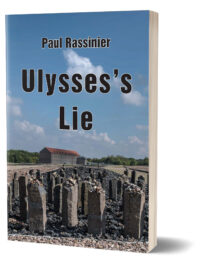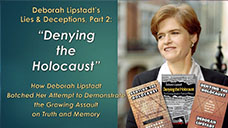The first part of the present book first appeared in 1948 in the French language, the second part two years later. What relevance could such an old book have today?
The last concentration camps of the Third Reich were overrun by Allied troops in April 1945. What importance could the subject of the camps of the Third Reich, which is even older than the first edition of this book, still have today?
The answers to both questions are tightly interwoven. Rassinier’s maiden effort is still relevant not only for the reason that the matter of the concentration camps seems never to lose relevance, but especially for critical historians such as lovers of history, precisely because Rassinier is an eyewitness one can trust to fabricate nothing nor to exaggerate anything. Wherever he might slip is in every case a matter of honest mistake.
Rassinier’s testimony is indeed old, but in the milieu of historical research, this is more a virtue than a defect. Reports of experience of historical events are generally that much more reliable the earlier they are recorded after the events in question, because the recollections, which are often flawed from the start and are stored in the human memory that is only partly reliable anyway, are known to fade with time. This applies especially and more powerfully to recollections that are passionately gone over both in the media and privately, in the course of which the recollections are progressively distorted or even completely displaced.
For this reason alone, one must regard accounts of the camps of the Third Reich particularly askance that were not set down as promptly as possible after the events, since there is surely no other subject that has been quite so worked over incessantly for the past 70 years with anything like the multi-media prominence and concomitant legally enforced one-sidedness throughout the world.
Rassinier waited three years before his chronicling effort, which was a long time according to his view. A certain distance from traumatic experiences may permit an approach to its account in a manner less emotional or distorted. Viewed from today’s perspective, that is, of a time 70 years after the events in question and the eyewitnesses to this day have not ceased broadcasting their “memories” by all available media channels, Rassinier’s account by contrast stands among the early and for this very reason most-reliable accounts.
The relevance of the present book, however, derives even more from the context in which it arose. To explain this, I must go back in time.
Four months ago, I finished my work to publish the new edition of Jürgen Graf’s critical analysis of eyewitness testimony and perpetrator confessions regarding Auschwitz Camp. The book is a milestone in the multifarious, indeed overpopulated literature of the Holocaust, that was so filled with unconfirmed rumors as well as lavishly praised first-person accounts of survivors and purported perpetrators such as seems utterly immune to confirmation of its sources. Graf’s book scrutinizing this body of material is a healthy antidote to it.
Graf’s source-critical, indeed skeptical, approach, however, contains a hazard. The most-obvious of these is that the reader, having read Graf’s expose, refuses to believe anything any witness to the Holocaust has to say. If so much of what is said on this subject is wrong, garbled, lied about and fabricated, what, then, might be believed?
This very question was posed to the late French historian Jean-Claude Pressac in an interview that was printed in an appendix to a doctoral dissertation on the history of Holocaust revisionism in France. Therein, Pressac characterized the establishment historiography of the Holocaust as “rotten,” in that it rested upon too many fantasies, vagaries and exaggerations. To the question of whether the course of the history of the camps of the Third Reich might yet change, he answered (Igounet 2000, pp. 651f.):
“On the one hand, resentment and vindictiveness [of the survivors] have gained the upper hand over reconciliation, and therefore memory the upper hand over history. On the other hand, the communist stranglehold on the most important leadership positions in the camps, the formation of associations after the liberation under communist control as well as the fifty-year-long creation of a ‘people’s democratic’ history of the camps has led to the emergence of the virus of the clumsy anti-fascist language. Shoddiness, exaggeration, omission and lies are the hallmarks of most accounts from this era. The unanimous and irrevocable discrediting which has afflicted the communist writings must inevitably have consequences for the depiction of life in the concentration camps, which is spoiled by the communist idea, and thus must finish it off.
Can this development be reverted? It is too late. A general correction is factually and humanely impossible. Each historical change results in a devaluation of a rigid memory that has been described as definitive. And new documents will unavoidably turn up and will overthrow the official certainties more and more. The current view of the world of the [National Socialist] camps, though triumphant, is doomed. What of it can be salvaged? Only little. Puffing up the universe of the concentration camps amounts to squaring the circle and to turning black into white. The consciousness of the people does not like sad stories. The life of a zombie isn’t ‘fecund’, all the more so as the pain has been exploited and turned into hard cash: decorations, pensions, careers, political influence. One cannot be at once victim and privileged, even executioner.
Of all these events, which were terrible because they led to the death of women, children and old people, only those will prevail whose reality is ascertained. The others are assigned to the dustbin of history.”
In view of this disaster of historiography, some observers may be inclined to throw the baby out with the bathwater, i.e. not to believe any witnesses and to consider everything that is reported about Hitler’s camps to be nothing but lies – falsus in uno, falsus in omnibus, or as the German proverb says so well: whoever lies once, won’t be believed anymore, even if he speaks the truth.
So were Hitler’s camps vacation centers after all?
Paul Rassinier, who is rightly considered the founder of Holocaust revisionism and whose fame (or infamy, depending on your perspective) is based precisely on this book, helps us all avoid such a tragic error. Even if much of what was reported by a considerable number of witnesses was distorted and exaggerated, sometimes even fabricated, the camps of National Socialism were nevertheless, on the whole and for long stretches, places of horror, suffering and crimes. However, they were all this in a different sense than what is commonly attributed to them to this day. The present book explains this in detail through the account of a pacifist who had the misfortune of being incarcerated in two of these camps for over a year.
Paul Rassinier’s merit, then, is not only to remind historians that objective, unsparing source criticism is one of their most important basic requirements of historiography, and to admonish policymakers that peace and justice require historical openness and honesty, but also to prevent all of us – laymen and historians alike – from overshooting the mark in the zeal of revision, and losing sight of some fundamental, ugly truths about the prison and concentration camps not only, but especially, of the Third Reich.
In this respect, this is a book that should never lose its relevance.
* * *
When it comes to the actual and alleged crimes committed in the camps of the Third Reich, the main focus of the public as well as of established historians is on the people who responsibly supervised and ran these camps, i.e. the respective members of the SS.
Rassinier is far from absolving these SS men of any guilt. However, his book makes it clear that the internal inmate leadership in the camps was to a considerable extent responsible for many of the atrocities committed in the camps. In this context, the SS must be accused of complicity, or at least gross negligence, by allowing the inmate leadership to engage in their criminal acts, turning a blind eye to them, doing nothing or not enough about it, or even supporting this terror of the inmates among themselves in order to derive various benefits from it. Rassinier exposes the diverse aspects of this ugly side of the concentration camps in this study.
One could, of course, accuse the SS men in general of having participated in the concentration camp system of the Third Reich in the first place. In fact, for the past 10 years or so, this has been the general approach of the German justiciary, which has put on trial for accessory to murder any former SS man who served in the administration or guard force of any concentration camp. However, I consider such an approach morally and legally untenable.
I myself was a political prisoner in German prisons for almost 44 months – from November 2005 to July 2009 (see Rudolf 2016a&b). Admittedly, my experiences in the liberal German penal system of the 2000s are absolutely incomparable to the prison conditions Rassinier had to experience. But that is not what matters to me here. My point is whether I could have held my jailers morally responsible for imprisoning me for my peaceful writings. The idea would never have occurred to me. In fact, such a line of thought is absurd.
I clearly remember once trying to make the guards aware of my situation. I wanted to at least enlighten one of the guards as to why I was behind bars.
“Do you want to know why I am here?” was my curt question when my cell door was opened very briefly on the occasion of serving lunch.
“No” was the completely disinterested answer of the guard, who didn’t even pause and went right on.
As a second step, I then created a poster explaining the background of my political imprisonment, and I stuck it on the outside of my cell door during a yard visit. The only effect of this was that I caused a gathering of prisoners outside my cell door, who eagerly read the poster and began to discuss it. The guards, however, showed no interest. They simply asked me to remove the poster for security reasons, so that such gatherings of prisoners in front of my cell would cease.[1]
How could I expect any of the guards to be interested in finding out from an inmate why he was being held? If he wants to know, he looks it up in the inmate’s files. Relying on an inmate’s testimony is a bad idea.
One of the first experiences I had in prison is that it’s full of innocent people. The repentant, confessing, penitent inmate is not exactly the norm. On the contrary! Among drug dealers, thieves, fraudsters, robbers and murderers, the grand lie is very much at home. With occasional exceptions, the dregs of society are held together in prison, and they pity each other for the injustice that has befallen them. Moral sentiments such as honesty cannot necessarily be expected from prison inmates, especially when it comes to their crimes. Therefore, it would be foolish at best for a prison guard to agree to talk to any inmate about why they are serving time. That’s why it virtually never happens.
In any case, the prison guards – excuse me: correctional officers – are also the wrong address for such a discussion. The only competence they have is, to put it crudely, to turn the key one way or the other on orders from above. They have neither the necessary background knowledge nor the competence to even raise the question of why someone is imprisoned, let alone to question whether everything is above board in every case of imprisonment. That is the responsibility of the judiciary. The correctional officers cannot and must not even consider this during their service.
Moreover, most of the guards who come into direct contact with the prisoners do not come from the best-educated strata of the population. Thus, they usually lack the interest and intellectual tools to think about the structure of a justice system and its possible transgressions.
A career as a prison guard ultimately means a lifetime of working in the depressive environment of a prison. It’s not a dream job, to put it mildly, or as we prisoners used to quip to the guards:
“The difference between us prisoners and you guards is that we get out after we serve our sentence, while you have to stay for life!”
However, most guards escape this self-imposed life sentence sooner or later by resigning. Even in liberal prison systems like that of Germany, many correctional officers cannot stand it having to imprison and make suffer people of their own living environment and social milieu – no matter what they may have done wrong.
“The difference between you and me,” a guard once told me, “is only that you got caught, while I was not.”
This was especially true of those guards who sometimes took me aside and secretly told me that they thought my books were quite admirable, and that it was a scandal that scholars like me were locked up for such books.
Should I have asked them to let me out, then? That would have been too much to ask. Too many people would have to collaborate in such an attempt at escape to keep it a secret, and all admiration of the guards comes to an end at some point, namely where their career or even freedom would be put at risk. So, I never even seriously considered asking them to help me escape…
Let us now apply these findings to the time of the Third Reich. Let us always keep in mind that the “liberal penal system” had not yet been invented anywhere in the world at that time.
Today, one expects from the prison and camp guards of that time that they must have recognized which injustice was done to the prisoners, and that they should have drawn appropriate consequences from it. After all, even in peacetime, hundreds, even thousands of political prisoners were imprisoned in camps like Dachau and Buchenwald, not to mention the hundreds of thousands, even millions of religiously, politically and racially persecuted people who were imprisoned in the thousands of camps at the time of Rassinier’s imprisonment.
Is such an expectation realistic?
If it is not realistic today, as I have illustrated on the basis of my own experiences, why should it have been any different then? Does one seriously expect simple SS men on the spot to annul the decisions of much higher, if not the highest, authorities of their government, to the wording of which they did not even have access to in the vast majority of cases, and to replace these orders with their own ideas as they saw fit? What did the SS men know on what legal basis this or that inmate was admitted? He could not know; he could not find out; and if, for once, he could, he usually could not question it at all. He had neither the right, the competence, nor the possibility or opportunity to do so. Was he supposed to ask every prisoner for reasons and justifications? Really? See my comments on this above…
Even if one of the SS men had seriously considered refusing to follow an order, he would have had to have the cooperation or at least acquiescence of many other SS men – subordinates as well as superiors – to make it have any consequences, and that would never have worked. There was a good reason why the leadership of communist East Germany during the Cold War always posted three soldiers on each of the watchtowers on the inner-German border, who also changed their posts regularly. One border guard alone could not be trusted by the regime; two border guards could have conspired; but once three people are together who do not know each other, it is almost impossible to build a conspiracy against the authorities, since the distrust between three strangers seems insurmountable. In the concentration camps, each SS man had to deal with tens or even hundreds of SS comrades. In such circumstances, a systematic conspiracy against orders from above that were considered inhumane was already completely unrealistic.
While no SS man could be forced to serve in a concentration camp in peacetime – except perhaps by economic constraints – the situation changed drastically during the war. SS members were simply ordered to do it, and submitting requests for transfers elsewhere, even to the front, were rarely successful. One could not simply “resign.” That would have amounted to desertion, which could end with a death penalty.
Whereas in Germany today, lower-level correctional officers have very frequent and very intimate contact with the prisoners in their facilities, this was different in the camps of the Third Reich, once the camps were established. There, the internal administration was left to a large degree to the prisoners themselves. The emotional distress that many of today’s German prison guards feel as a result of the emotional suffering that they experience firsthand on a daily basis among the detainees, and that they feel like they are contributing by locking inmates up with their keys, was in many cases alien to the SS guards back then. Whenever they could arrange it, they essentially just stood outside the perimeter fence. The fear of ubiquitous epidemics such as typhus and dysentery reinforced this tendency.
But shouldn’t it have been clear to the SS officers at the time that the entire camp system was unlawful, just as most of those imprisoned in it were placed there without any due process?
Can one really expect such conclusions from ordinary people? The analyses of behaviors of even highly educated people have shown that even among them few can think outside well-traveled paths. Group or herd thinking often dominates the behavior of a group that is not exposed to criticism by outsiders, or does not take it seriously. The Third Reich was very good at excluding the thoughts of outsiders from broad discussion. It was therefore not an open society in Popper’s sense.
As Rassinier shows with many examples, the inhumane treatment of inmates was and is a problem that can by no means be limited to the Third Reich. The core of the problem lies in the fact that the public was not informed factually and comprehensively, if at all, of the things that took place in the camps and prisons. Had the events become generally known through reputable sources, there certainly would have been massive protest, and the regime would have been forced to relent. The Hitler regime, however, had declared everything that happened in its camps to be secret, and neither the media nor non-governmental groups were allowed regular and unrestricted access there. Such transparency alone can prevent abuse of power, or at least help to identify and stop it at an early stage.
Power corrupts, and uncontrolled power corrupts absolutely. Wherever a government claims to keep something secret from its citizens or the public, sooner or later rules and laws are broken, and crimes are often committed with impunity. Just think of Guantanamo Bay and other secret penal camps of the leader of the “free” world, where the USA insists on being allowed to hide their actions from the public. Or take the CIA, which operates largely in secret and is considered by those in the know to be the world’s largest criminal organization.
In Nuremberg, some of the major culprits of the Third Reich were hanged, and since then, in thousands of trials, members of the lower ranks were held accountable for things that, in some instances, did not happen at all, or that, in many cases, were beyond their control. The real culprit, however, has not even been clearly named yet. This is the view that a government has the right to keep secrets from the public. State secrets, however, are practically always synonymous with state crimes. If one wants to put an end to the latter, one must categorically prohibit the former under constitutional law. In a republic, all affairs of state must be a matter for the public (Latin: res publica). There must be no state secrets. As soon as a state has secrets, it is by definition no longer a republic. Even the slightest concession in this matter is dangerous, for if a state is allowed even once to have secrets in a small subject area, that subject area beyond the light of public scrutiny naturally has a tendency to proliferate like a cancer.
This may sound like a radical idea, but I see no other solution to this problem. After all, the state, as the largest aggregate of power, is always potentially the most dangerous enemy of civil rights. To protect the latter, people must first and foremost have the civil right to know what the state is doing. Any state secrecy is a crime against the idea of the republic, and an undermining of the idea of popular rule. For rule of the people by the people is possible only, where people can inform themselves comprehensively and without limits about what the government they have elected is doing. Therefore, where a government keeps secrets from the electorate, not only is there no longer a republic, but democracy as such is undermined.
In this respect, there has never been a true republic and democracy in history. For every state of yesterday and today had or has secret services, that is to say, it maintained or maintains a branch of government which, by definition, was or is designed to be a criminal organization. It doesn’t matter whether these are called Gestapo, Stasi, KGB, CIA, intelligence services, national security services, offices for the protection of the constitution, state security departments or other dirty government departments, which allow the state, under the cloak of secrecy, to break the laws more or less as it sees fit, and without effective public supervision. As long as these organs keep secrets, they are anti-civil-rights, anti-people, anti-democratic, anti-republican institutions.
The difference between the Third Reich and all other states is therefore only a matter of degree, not of principle. The political prisoners serving time in Germany and many other European countries today are striking proof of this, but at the same time, they are merely the tip of the iceberg.
* * *
This topic gives me the opportunity to round out my preface with some general observations on Rassinier’s views of the literature on the concentration camps.
Rassinier was an optimist about his hopes for the development of objective criticism of the statements of the “deportees.” He writes in his introduction to Part Two of the present book on page 135 that the stories of those deported to camps of the Third Reich were taken at face value only immediately after the end of the war, not least because otherwise any doubters would have exposed themselves to serious danger of various persecutorial measures. However, with the return of freedom of expression that he noted, the ugly truth increasingly came to light, and it took only four years – from 1945 to 1949 – for the writings of those deported to lose their reputation in the view of public opinion. “Travelers from afar can lie with impunity,” he quotes French professor of Catholic theology, Dr. Marius Perrin, in this regard.
It seems to me that Rassinier severely underestimated the power of the deportees, and vastly overestimated the impact of his own criticism, which for years resembled the crying of an outcast lone prophet in the wilderness.
In fact, the stories of the deportees is revered by public (or rather published) opinion today in such a boundlessly fashion as finds a parallel only in the public veneration of the stories told about catholic saints in centuries long since passed. The American political scientist Dr. Norman Finkelstein said aptly in 2000 (p. 82):
“Because survivors are now revered as secular saints, one doesn’t dare question them. Preposterous statements pass without comment.”
And as far as freedom of expression on this subject is concerned, things look quite bad in this respect. Although Rassinier correctly states in his preface on page 34 that historical and social debates should neither be brought before the judiciary nor be decided by court rulings, this is exactly what has happened since then. Although Rassinier succeeded in staying the criminal proceedings against him in France, and winning the civil-law suit filed against the present book in Germany, which was initiated by one of the authors he criticized, Eugen Kogon (cf. footnote 4 on page 22 and the accompanying remarks), his following words have proved only too true in the decades since:
“But the […] leaders of the […] associations of deportees, in whose favor the levers of the state play so complacently, do not conceive of any other truths than those which are decreed, and which the police enforced in public. They are not against concentration camps because they are concentration camps, but because they themselves were locked up in them: as soon as they were liberated, they demanded that the others be put there.”
Of course, peaceful history dissidents are not locked up in concentration camps today, but together with drug dealers, thieves and fraudsters in normal prisons. Thus, they are lost among the mass of normal criminals, and there is no problem when facing public scrutiny: they are all normal criminals, like everyone else… The fact is that freedom of speech concerning the history of the Third Reich and its classification or evaluation has been systematically undermined and finally abolished in most European countries as well as in Canada, Australia and Israel by an incessant campaign – led by the associations of deportees and their fan base.
The deeper reason for this return to dictatorial conditions was, of course, that the criticism of the deportees’ stories, launched by Rassinier, increased drastically in the 1970s, and assumed avalanche-like proportions since the late 1980s. To contain this revision, not to say revolution, of historiography, the emergency brake was pulled in the form of criminal law.
However, those who punish the messenger instead of discussing the message only prove that they have run out of arguments.
On the level of arguments, I may draw the reader’s attention in this book to Rassinier’s views on the alleged execution gas chambers of the Third Reich. In his preface on page 31, written for the second edition, he said that he considered their existence “possible, but not certain: without fire there is no smoke,” and in Chapter IV of Part Two he says that it is still too early to give a final verdict on this (p. 172). At that time, he still held the following viewpoint:
“My opinion about the gas chambers? There were some, but not as many as is assumed. Exterminations by this means also took place, but not as many as is claimed.” (Page 176)
In his later books, written after further research, he revised this opinion to the effect that he considered it far more likely that all human gas chamber stories were untrue (cf. Rassinier 1963 & 1965). This shows that he certainly did not approach this subject with a preconceived notion, but constantly revised his opinion according to the evidence.

Censorship map of Europe: All dark-shaded countries have explicitly or implicitly criminalized dissident views on the Holocaust in one way or another since at least the year indicated in each case.
Almost prophetic is the hint made after his above remark (page 177):
“In any case, one symptomatic fact has been rarely emphasized: in the few camps where gas chambers were found, they were attached to the sanitary disinfection facilities and showers, which contained water installation, rather than to the crematorium furnaces, and the gases applied were vapors of cyanide salts, that is, of products that form pigment compounds, mainly blue ones, of which Germany made such abundant use during the war.”
Indeed, later revisionist research has shown how resistance groups inside and outside the camps, as well as the Allied victors, spread lies about the disinfestation and hygiene facilities in the camps of the Third Reich, mendaciously turning them into execution devices (cf. especially Mattogno 2016 & 2016a). Rassinier’s reference to the connection between “vapors of cyanide salts” and blue pigments points into a direction that revisionism later explored in great depth (cf. Leuchter/Faurisson/Rudolf as well as Rudolf 2020).
The topic of the homicidal gas chambers will not be discussed in detail here. The interested reader will find references to some pivotal studies of today’s critical literature on the subject at the end of this book.
* * *
This edition of Rassinier’s first work was adapted to the original French version. We also reproduce Rassinier’s original prologue to Part One in the appendix. It consists almost entirely of press reports about abuses in prison camps and prisons in other countries. The reader understands the significance of these reports best after reading the book itself, which is why we did not place it at the beginning where it originally was.
We have also added the original preface by Albert Paraz in the appendix of this book. It had been removed from later French editions because of fears of civil lawsuits from various sides, but this later turned out to be groundless. Since Paraz’s remarks are not always comprehensible to a reader far removed from that era, I have commented on them in detail in footnotes.
Also in the appendix are a number of press reviews that have appeared in France on Rassinier’s first two books, published as one book in this tome, as well as a brief overview of the criminal proceedings that were – ultimately unsuccessfully – initiated in France against Rassinier’s second book (here Part II). This text is based on the French Internet version of the present book, which is based on the 1980 reprint by La Vieille Taupe.[2]
A few of Rassinier’s remarks in his preface, as well as in Part Two, required commentary in light of further research, which I have placed in footnotes in each case.
Germar Rudolf,
Red Lion, Pennsylvania,
December 15, 2018
[1] That was in pretrial detention in Stuttgart-Stammheim. The prisoners were let out of their cells for an hour every day to walk around the yard, twice a week to take a shower, and for the daily so-called “Umschluss”, when inmates are allowed to visit other inmates in their cell for a few hours.







